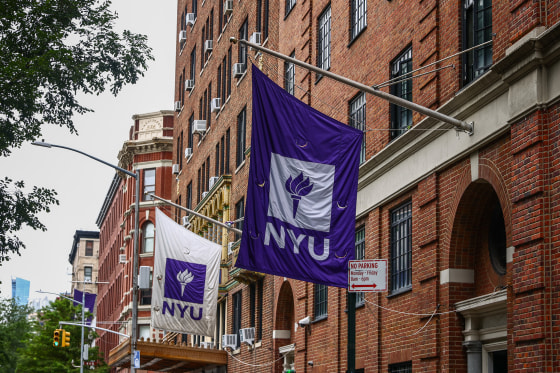The New York Police Department's Hate Crime Task Force is investigating an act of vandalism reported this week at an Islamic prayer space at New York University.
A student who entered the space in the Elmer Holmes Bobst Library on Thursday afternoon reported finding "urine and obscene, lewd images defacing the walls," Faiyaz Jaffer, the university's associate chaplain of Global Spiritual Life, said in a statement.
"This was not simply an act of vandalism; it was a malicious and deeply disrespectful attack driven by anti-Muslim hatred," Jaffer said.
The vandalism coincides with the Trump administration's efforts to deport international students and scholars, some of whom are Muslim and have expressed support for Palestinian human rights amid the war in Gaza, including Mahmoud Khalil and Rumeysa Öztürk.
Pictures posted to the Instagram account of NYU's Black Muslim Initiative show the vandalism, which appears to include a large drawing of a phallus. Another image shows what appears to be a wet stain near Islamic prayer mats.
A criminal mischief report was filed with police, and the hate crime task force was alerted. Police said the perpetrator "scratched and chalked an image" in the room at 70 Washington Square South at around 4:40 p.m. Thursday.
"There are no arrests and the investigation remains ongoing," police said.
In a statement, NYU spokesperson John Beckman called the vandalism "vile, reprehensible, and utterly unacceptable."
"It contravenes every principle of our community, and we condemn this act of Islamophobia and anti-Muslim hate," Beckman said.
He vowed to hold those responsible accountable.
The Muslim Student Association at NYU said that it is pushing for changes to protect its spaces on campus and that over 1,000 students have signed a petition condemning the vandalism.
"This shows what we've always known: we have a voice, we have power when we come together, and we are not alone in this fight," it said in a statement Thursday on Instagram. "The university administration needs to see that this isn't just a 'Muslim issue' — this is about the kind of community NYU wants to be."
The university's Black Muslim Initiative demanded immediate action from the administration, including the expulsion of the perpetrator or perpetrators if they are found to be students, and the installation of security cameras outside the prayer space.
The Council on American-Islamic Relations (CAIR) has called on state and federal law enforcement agencies to launch a hate crime investigation into the vandalism, which they say happened "despite ongoing concerns raised by the campus Muslim community over the past year about their safety and the university’s inaction."
"We join students in demanding a full hate crime investigation and disciplinary action against the perpetrator," CAIR-NY Executive Director Afaf Nasher said in a statement. "No student should fear for their safety or dignity while practicing their faith."
Jaffer said the vandalism's impact on the university's Muslim community was "immediate and severe," causing many students fear, anxiety and concerns for their well-being. He also emphasized that Thursday’s vandalism has intensified the distress of Muslim international students — who already fear the Trump administration's recent policies cracking down on many who supported the pro-Palestinian movement. The administration has revoked over 300 student visas of foreign-born people.
"We have a serious problem with Islamophobia and it is now time that we confront it," Jaffer said. "The hatred that motivated this act of vandalism is not something that will just disappear if we ignore it. It's a systemic issue, a disease that threatens to erode the very fabric of our institutions and society as a whole."

